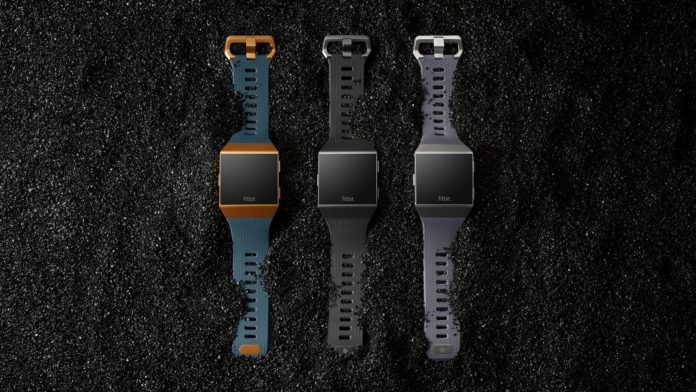
San Francisco-based wearable manufacturer Fitbit on Monday announced the launch of its first fitness-oriented smartwatch, dubbed as the “Fitbit Ionic” in the crowded wearables market. Like many of the smart fitness trackers, the Fitbit Ionic also comes with fitness tracker support, heart rate sensor, built-in GPS, swim tracking, water resistance up to 50 meters, onboard music and much more. Carried a price tag of $299.95 (approximately Rs. 19,150), the Fitbit Ionic will be made available in three exciting colour combinations including Slate Blue band with Burnt Orange case, Blue Grey band with Silver Grey case and Charcoal band with Smoke Grey case. Currently, the fitness tracker is listed on the company’s official website for pre-orders, while the shipment services for the Fitbit Ionic smartwatch will start worldwide beginning October 2017 via various North American retailers including Amazon, Best Buy, Dick’s Sporting Goods, Kohl’s, Macy’s, REI, Target and Verizon.
Fitbit Ionic Specifications and Features:
Fitbit Ionic, similar to many other wearable fitness tracker bands available out there, sports a 1.42-inch LCD (348 x 250 pixels) touchscreen display that allows the users to get useful information like notifications for phone calls, SMS, physical activity related information and a number of calories consumed.
As we mentioned, the Fitbit Ionic smartwatch is a water resistance device as it can survive in up to 50 meters of water.
The smartwatch also features company’s improved PurePulse heart rate monitoring technology with greater accuracy that can detect and measure heart rate accurately during high-intensity exercises like cycling, intervals and running. Further, it sports a new sensor technology, called “relative SpO2 sensor” that allows users to estimate and track the oxygen levels in the blood.
The Fitbit Ionic offers the same features as we have seen on the other Fitbit wearables, including sleep stage monitoring, automatic exercise tracking and swim tracking. The new Swim Exercise mode shows real-time laps, exercise duration, and calories consumed for pool swims. It comes with a new Run Detect feature that kicks in GPS tracking and tracks your workouts automatically. The Fitbit Ionic also comes packed with an integrated antenna inside that provides a stronger connection to GPS and GLONASS satellites to track the owner’s pace, distance, elevation climbed, split times and a map of user’s walk.
It is compatible with both operating systems Google Android (4.4 and later) and Apple iOS (4S and later). Besides the Fitbit Ionic launch, the company also introduced a new personalised training and coaching app, called the Fitbit Coach which has been designed to analyse Fitbit data and activity level to deliver a custom guideline of workouts and programs for user’s specific health and fitness routines. Fitbit Coach is an upgraded version of the current FitStar Personal Trainer app, which provides guided and popular video workouts with audio coaching sessions to increase patience, speed and form on your scheduled health and fitness routines. It will be available through the paid-for service (will be launching next year). It will cost $7.99 for one-month subscription or $39.99 per year.

The Fitbit Ionic runs on the company’s proprietary Fitbit OS that means all the apps will be available through the Fitbit App Gallery. Fitbit OS not only allows the smartwatch to link up to your smartphone for notifications but it also features an array of apps including third-party developed apps from companies like AccuWeather’s weather app, Starbucks, Pandora and Strava guided training. The company will release a web-based SDK (software development kit) in mid-September and the SDK will allow any developers to create apps or to create their own watch faces using Javascript and SVG.
Sensors on the Fitbit Ionic include 3-axis Accelerometer, 3-axis Gyroscope, Optical heart rate monitor, Ambient light sensor and Altimeter. Connectivity options offered by the wearable include Wi-Fi 802.11 b/g/n, Bluetooth v4.0 Low-Energy, GPS/GLONASS and NFC for mobile payments. Like Android Pay and Apple Pay, the Fitbit Ionic also supports contactless payments with the new Fitbit Pay feature, which allows users to tap the Ionic smartwatch on a shop’s contactless payment terminal.
“Over the coming months you will be able to add eligible American Express cards, as well as Mastercard and Visa credit and debit cards from top issuing banks in over 10 markets across the globe,” the company said.
In terms of storage, the Fitbit Ionic comes loaded with a storage capacity of 2.5GB, which allows users to download their own music or Pandora playlists (for premium subscribers) and to hold up to 300 songs, audiobooks or podcasts.
On the battery front, Fitbit’s new offering comes packed with a decent Lithium-polymer battery that is rated to deliver up to “4+ days” battery life on normal usage and up to 10 hours of battery life on GPS or music playback. Notably, the battery life and charge cycles may vary depending on user’s activity.
The Fitbit Ionic smart-band is made of a flexible, durable elastomer material for better durability and the watch case and buckle are made of aluminium.
























